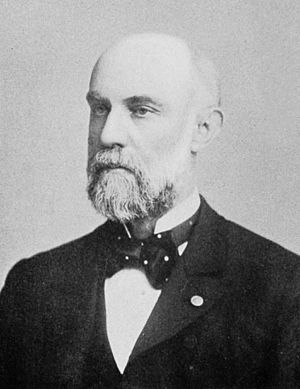Walter Evans (American politician) facts for kids
Quick facts for kids
Walter Evans
|
|
|---|---|
 |
|
| Judge of the United States District Court for the Western District of Kentucky | |
| In office July 1, 1901 – December 30, 1923 |
|
| Appointed by | operation of law |
| Preceded by | Seat established by 31 Stat. 781 |
| Succeeded by | Charles Harwood Moorman |
| Judge of the United States District Court for the District of Kentucky | |
| In office March 3, 1899 – July 1, 1901 |
|
| Appointed by | William McKinley |
| Preceded by | John W. Barr |
| Succeeded by | Seat abolished |
| Member of the U.S. House of Representatives from Kentucky's 5th district |
|
| In office March 4, 1895 – March 3, 1899 |
|
| Preceded by | Asher G. Caruth |
| Succeeded by | Oscar Turner |
| 10th Commissioner of Internal Revenue | |
| In office May 21, 1883 – March 19, 1885 |
|
| President | Chester A. Arthur |
| Preceded by | John Jay Knox Jr. (acting) |
| Succeeded by | Joseph S. Miller |
| Member of the Kentucky Senate | |
| In office 1873-1875 |
|
| Member of the Kentucky House of Representatives | |
| In office 1871-1873 |
|
| Personal details | |
| Born |
Walter Evans
September 18, 1842 Glasgow, Kentucky |
| Died | December 30, 1923 (aged 81) Louisville, Kentucky |
| Resting place | Cave Hill Cemetery Louisville, Kentucky |
| Political party | Republican |
| Relatives | Burwell C. Ritter |
| Education | read law |
| Signature | |
Walter Evans (September 18, 1842 – December 30, 1923) was an important figure in American law and politics. He served as a U.S. Representative for Kentucky and later became a federal judge. He held positions in both the United States District Court for the District of Kentucky and the United States District Court for the Western District of Kentucky.
Contents
Early Life and Public Service
Walter Evans was born on September 18, 1842, in Glasgow, Barren County, Kentucky. He went to public schools near Harrodsburg, Kentucky. In 1859, he moved to Hopkinsville, Kentucky, and worked as a deputy county clerk.
During the American Civil War, Evans served in the Union Army from 1861 to 1863. After his military service, he became a deputy clerk and then the chief clerk of the circuit court. He studied law on his own, a process called "reading law," and became a lawyer in 1864. He then worked as a private lawyer in Hopkinsville until 1871.
Evans was very involved in politics. He was a delegate to the Republican National Convention several times (in 1868, 1872, 1880, and 1884). He served in the Kentucky House of Representatives from 1871 to 1873 and in the Kentucky Senate from 1873 to 1875. After his time in the state legislature, he moved to Louisville and continued his private law practice from 1875 to 1883.
In 1883, President Chester A. Arthur appointed him as the Commissioner of the Bureau of Internal Revenue. This agency is now known as the Internal Revenue Service (IRS), which collects taxes for the U.S. government. He held this important role from May 1883 to April 1885. After this, he returned to his law practice in Louisville, working there until 1895.
Serving in Congress
In 1895, Walter Evans was elected as a Republican to the United States House of Representatives from Kentucky's 5th congressional district. He served two terms in Congress, from March 4, 1895, to March 3, 1899. During his time in Congress, he helped make laws for the entire country.
Becoming a Federal Judge
After his time in Congress, President William McKinley nominated Walter Evans to become a federal judge. On March 3, 1899, he was appointed to the United States District Court for the District of Kentucky. The United States Senate approved his appointment on the same day.
Later, on July 1, 1901, the court system in Kentucky was reorganized. As a result, Judge Evans was reassigned to a new position on the United States District Court for the Western District of Kentucky. He continued to serve as a federal judge until his death on December 30, 1923, in Louisville, Kentucky. He was buried at Cave Hill Cemetery in Louisville.
Family Connections
Walter Evans was related to another notable politician, Burwell C. Ritter. Ritter also served as a U.S. Representative.


